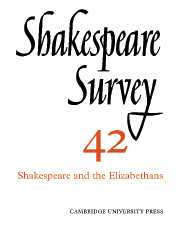Book contents
- Frontmatter
- ‘Jack hath not Jill’: Failed Courtship in Lyly and Shakespeare
- Truth and Art in History Plays
- Chronicles and Mythmaking in Shakespeare’s Joan of Arc
- King John and Embarrassing Women
- Golding’s Ovid, Shakespeare’s ‘Small Latin’, and the Real Object of Mockery in ‘Pyramus and Thisbe’
- Ovid and the Sonnets; or, did Shakespeare Feel the Anxiety of Influence?
- The Play of Sir Thomas More and Some Contemporary Events
- ‘Nobody’s Perfect’: Actors’ Memories and Shakespeare’s Plays of the 1590s
- The Boyhood of Shakespeare’s Heroines
- Shakespeare’s ‘Brawl Ridiculous’
- Shakespeare’s Handwriting
- Shakespeare Performances in England, 1987–8
- Professional Shakespeare Productions in the British Isles, January-December 1987
- The Year's Contributions to Shakespearian Study 1 Critical Studies
- 2 Shakespeare’s Life, Times, and Stage
- 3 Editions and Textual Studies
- Books Received
- Index
Ovid and the Sonnets; or, did Shakespeare Feel the Anxiety of Influence?
Published online by Cambridge University Press: 28 March 2007
- Frontmatter
- ‘Jack hath not Jill’: Failed Courtship in Lyly and Shakespeare
- Truth and Art in History Plays
- Chronicles and Mythmaking in Shakespeare’s Joan of Arc
- King John and Embarrassing Women
- Golding’s Ovid, Shakespeare’s ‘Small Latin’, and the Real Object of Mockery in ‘Pyramus and Thisbe’
- Ovid and the Sonnets; or, did Shakespeare Feel the Anxiety of Influence?
- The Play of Sir Thomas More and Some Contemporary Events
- ‘Nobody’s Perfect’: Actors’ Memories and Shakespeare’s Plays of the 1590s
- The Boyhood of Shakespeare’s Heroines
- Shakespeare’s ‘Brawl Ridiculous’
- Shakespeare’s Handwriting
- Shakespeare Performances in England, 1987–8
- Professional Shakespeare Productions in the British Isles, January-December 1987
- The Year's Contributions to Shakespearian Study 1 Critical Studies
- 2 Shakespeare’s Life, Times, and Stage
- 3 Editions and Textual Studies
- Books Received
- Index
Summary
Early in The Anxiety of Influence, Harold Bloom announces that ‘the greatest poet in our language is excluded from the argument of this book’. He gives three reasons for this exclusion, one historical, one generic, and one individual. Historically, Bloom states, ‘Shakespeare belongs to the giant age before the flood, before the anxiety of influence became central to poetic consciousness’; only with eighteenth-century and Romantic notions of genius and originality does ‘the burden of the past’ become the poet’s overriding problem. Generically, Bloom thinks, drama is less susceptible to anxiety than is lyric: ‘As poetry has become more subjective, the shadow cast by the precursors has become more dominant.’ But for Bloom – and this accords with the essentially Freudian mode of his criticism – the most important cause is the individual one: ‘Shakespeare’s prime precursor was Marlowe, a poet very much smaller than his inheritor . . . Shakespeare is the largest instance in the language of a phenomenon that stands outside the concern of this book: the absolute absorption of the precursor. Battle between strong equals, father and son as mighty opposites, Laius and Oedipus at the crossroads; only this is my subject here.’
- Type
- Chapter
- Information
- Shakespeare Survey , pp. 65 - 76Publisher: Cambridge University PressPrint publication year: 1990
- 1
- Cited by

